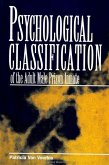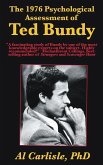- Broschiertes Buch
- Merkliste
- Auf die Merkliste
- Bewerten Bewerten
- Teilen
- Produkt teilen
- Produkterinnerung
- Produkterinnerung
This engaging book presents a contextual psychological interpretation of crime. It covers essential topics including psychopathy, antisocial personality disorder, and criminal lifestyle. The author's compelling analysis explains criminal behavior, by showing how the criminal lifestyle is capable of integrating two seemingly incompatible crime paradigms: the career criminal paradigm and the criminal career paradigm. Starting with a context for criminality, and then moving from particular conceptions of crime to more evidence-based theories, this volume challenges students to think in a different way about crime and criminal behavior.…mehr
Andere Kunden interessierten sich auch für
![Psychological Criminology Psychological Criminology]() Richard WortleyPsychological Criminology196,99 €
Richard WortleyPsychological Criminology196,99 €![Psychological Criminology Psychological Criminology]() Richard WortleyPsychological Criminology272,99 €
Richard WortleyPsychological Criminology272,99 €![Psychological Violence in the Workplace Psychological Violence in the Workplace]() Emily SchindelerPsychological Violence in the Workplace66,99 €
Emily SchindelerPsychological Violence in the Workplace66,99 €![Psychological Classification of the Adult Male Prison Inmate Psychological Classification of the Adult Male Prison Inmate]() Patricia van VoorhisPsychological Classification of the Adult Male Prison Inmate83,99 €
Patricia van VoorhisPsychological Classification of the Adult Male Prison Inmate83,99 €![The 1976 Psychological Assessment of Ted Bundy The 1976 Psychological Assessment of Ted Bundy]() Al CarlisleThe 1976 Psychological Assessment of Ted Bundy22,99 €
Al CarlisleThe 1976 Psychological Assessment of Ted Bundy22,99 €![Psychological Knowledge in Court Psychological Knowledge in Court]() Gerald Young / Andrew W. Kane / Keith Nicholson (eds.)Psychological Knowledge in Court81,99 €
Gerald Young / Andrew W. Kane / Keith Nicholson (eds.)Psychological Knowledge in Court81,99 €![Imprisonment and its Psychological Effects on Inmates Imprisonment and its Psychological Effects on Inmates]() AnonymousImprisonment and its Psychological Effects on Inmates15,95 €
AnonymousImprisonment and its Psychological Effects on Inmates15,95 €-
-
-
This engaging book presents a contextual psychological interpretation of crime. It covers essential topics including psychopathy, antisocial personality disorder, and criminal lifestyle. The author's compelling analysis explains criminal behavior, by showing how the criminal lifestyle is capable of integrating two seemingly incompatible crime paradigms: the career criminal paradigm and the criminal career paradigm. Starting with a context for criminality, and then moving from particular conceptions of crime to more evidence-based theories, this volume challenges students to think in a different way about crime and criminal behavior.
Hinweis: Dieser Artikel kann nur an eine deutsche Lieferadresse ausgeliefert werden.
Hinweis: Dieser Artikel kann nur an eine deutsche Lieferadresse ausgeliefert werden.
Produktdetails
- Produktdetails
- Verlag: Sage Publications, Inc
- Seitenzahl: 288
- Erscheinungstermin: 8. August 2011
- Englisch
- Abmessung: 229mm x 152mm x 16mm
- Gewicht: 421g
- ISBN-13: 9781412996082
- ISBN-10: 1412996082
- Artikelnr.: 33141774
- Herstellerkennzeichnung
- Libri GmbH
- Europaallee 1
- 36244 Bad Hersfeld
- gpsr@libri.de
- Verlag: Sage Publications, Inc
- Seitenzahl: 288
- Erscheinungstermin: 8. August 2011
- Englisch
- Abmessung: 229mm x 152mm x 16mm
- Gewicht: 421g
- ISBN-13: 9781412996082
- ISBN-10: 1412996082
- Artikelnr.: 33141774
- Herstellerkennzeichnung
- Libri GmbH
- Europaallee 1
- 36244 Bad Hersfeld
- gpsr@libri.de
Glenn D. Walters received his Ph.D. at Texas Tech University in 1982 with a concentration in Counseling Psychology and a minor in Neuroscience. He is employed full-time as a psychologist in a correctional setting while also teaching courses, both graduate and undergraduate, as an Adjunct Professor at The Pennsylvania State University, Schuylkill, and Lehigh University. In addition to forensic psychology, he teaches abnormal psychology, psychological assessment, and developmental psychology. He has written two other books with SAGE: Drugs & Crime in Lifestyle Perspective (1994) and The Criminal Lifestyle: Patterns of Serious Criminal Conduct (1990). The present book is an outgrowth of the author¿s experiences teaching criminology and forensic psychology and the realization that crime is better understood once students appreciate the context of criminal development and desistance.
1. Understanding Crime: The Prime Context
Predator
Crime
In Context
The Organization of this Book
Conclusion
Key Terms and Concepts
2. Latent Structure: The Criminal Lifestyle in a Dimensional Context
The Self Mutilator
What is Latent Structure?
The Taxometric Method
Identifying the Number of Dimensions
Behavioral Dimensions of a Criminal Lifestyle
Cognitive Dimensions of a Criminal Lifestyle
Why Should We Care About Latent Structure?
Conclusion
Key Terms and Concepts
3. Classification: The Criminal Lifestyle in a Diagnostic Context
Mr. Consistency
Diagnostic Functions
Essentials of Categorical Diagnosis
Essentials of Dimensional Diagnosis
Constructing a Dimensional Diagnosis for the Criminal Lifestyle
Analyzing Trends and Identifying Patterns
Conclusion
Key Terms and Concepts
4. Assessment: The Criminal Lifestyle in an Appraisal Context
Tuesday's Child
Clinical Forensic Psychology
Construct Assessment
Risk Assessment
Broad-Band Clinical Forensic Assessment Instruments
Narrow-Band Clinical Forensic Assessment Instruments
Clinical Forensic Evaluation of Grace
Conclusion
Key Terms and Concepts
5. Development or Propensity: The Criminal Lifestyle in an Etiological
Context
Born Under a Bad Sign
Development versus Propensity in Explaining Crime
A Lifestyle Theory of Crime
Jerry Revisited: A Developmental Analysis
Conclusion
Key Terms and Concepts
6: Phenomenology: The Criminal Lifestyle in a Subjective Context
Married to the Mob
Phenomenology
Responses to the Ten Questions
Conclusion
Key Terms and Concepts
7. Intervention: The Criminal Lifestyle in a Programmatic Context
The Boxer
Programmed Intervention
Unassisted Change
The "Nothing Works" Controversy
Finding a Philosophy
Implementing the Program
Evaluating the Outcome
Conclusion
Key Terms and Concepts
8. Prevention: The Criminal Lifestyle in a High Risk Youth Context
Dennis the Menace
Primary, Secondary, and Tertiary Prevention
The Lifestyle Approach to Secondary Prevention
Conclusion
Key Terms and Concepts
9. Mental Illness and Malingering: The Criminal Lifestyle in an Application
Context
Tattoo
Mental Illness
Malingering
Conclusion
Key Terms and Concepts
10. Future Contexts and Distance Horizons
The Second Story Man
Understanding Crime: The Prime Context
Future Dimensional Contexts
Future Diagnostic Contexts
Future Appraisal Contexts
Future Etiological Contexts
Future Subjective Contexts
Future Programmatic Contexts
Future Preventive Contexts
Future Application Contexts
Conclusion
Key Terms and Concepts
Predator
Crime
In Context
The Organization of this Book
Conclusion
Key Terms and Concepts
2. Latent Structure: The Criminal Lifestyle in a Dimensional Context
The Self Mutilator
What is Latent Structure?
The Taxometric Method
Identifying the Number of Dimensions
Behavioral Dimensions of a Criminal Lifestyle
Cognitive Dimensions of a Criminal Lifestyle
Why Should We Care About Latent Structure?
Conclusion
Key Terms and Concepts
3. Classification: The Criminal Lifestyle in a Diagnostic Context
Mr. Consistency
Diagnostic Functions
Essentials of Categorical Diagnosis
Essentials of Dimensional Diagnosis
Constructing a Dimensional Diagnosis for the Criminal Lifestyle
Analyzing Trends and Identifying Patterns
Conclusion
Key Terms and Concepts
4. Assessment: The Criminal Lifestyle in an Appraisal Context
Tuesday's Child
Clinical Forensic Psychology
Construct Assessment
Risk Assessment
Broad-Band Clinical Forensic Assessment Instruments
Narrow-Band Clinical Forensic Assessment Instruments
Clinical Forensic Evaluation of Grace
Conclusion
Key Terms and Concepts
5. Development or Propensity: The Criminal Lifestyle in an Etiological
Context
Born Under a Bad Sign
Development versus Propensity in Explaining Crime
A Lifestyle Theory of Crime
Jerry Revisited: A Developmental Analysis
Conclusion
Key Terms and Concepts
6: Phenomenology: The Criminal Lifestyle in a Subjective Context
Married to the Mob
Phenomenology
Responses to the Ten Questions
Conclusion
Key Terms and Concepts
7. Intervention: The Criminal Lifestyle in a Programmatic Context
The Boxer
Programmed Intervention
Unassisted Change
The "Nothing Works" Controversy
Finding a Philosophy
Implementing the Program
Evaluating the Outcome
Conclusion
Key Terms and Concepts
8. Prevention: The Criminal Lifestyle in a High Risk Youth Context
Dennis the Menace
Primary, Secondary, and Tertiary Prevention
The Lifestyle Approach to Secondary Prevention
Conclusion
Key Terms and Concepts
9. Mental Illness and Malingering: The Criminal Lifestyle in an Application
Context
Tattoo
Mental Illness
Malingering
Conclusion
Key Terms and Concepts
10. Future Contexts and Distance Horizons
The Second Story Man
Understanding Crime: The Prime Context
Future Dimensional Contexts
Future Diagnostic Contexts
Future Appraisal Contexts
Future Etiological Contexts
Future Subjective Contexts
Future Programmatic Contexts
Future Preventive Contexts
Future Application Contexts
Conclusion
Key Terms and Concepts
1. Understanding Crime: The Prime Context
Predator
Crime
In Context
The Organization of this Book
Conclusion
Key Terms and Concepts
2. Latent Structure: The Criminal Lifestyle in a Dimensional Context
The Self Mutilator
What is Latent Structure?
The Taxometric Method
Identifying the Number of Dimensions
Behavioral Dimensions of a Criminal Lifestyle
Cognitive Dimensions of a Criminal Lifestyle
Why Should We Care About Latent Structure?
Conclusion
Key Terms and Concepts
3. Classification: The Criminal Lifestyle in a Diagnostic Context
Mr. Consistency
Diagnostic Functions
Essentials of Categorical Diagnosis
Essentials of Dimensional Diagnosis
Constructing a Dimensional Diagnosis for the Criminal Lifestyle
Analyzing Trends and Identifying Patterns
Conclusion
Key Terms and Concepts
4. Assessment: The Criminal Lifestyle in an Appraisal Context
Tuesday's Child
Clinical Forensic Psychology
Construct Assessment
Risk Assessment
Broad-Band Clinical Forensic Assessment Instruments
Narrow-Band Clinical Forensic Assessment Instruments
Clinical Forensic Evaluation of Grace
Conclusion
Key Terms and Concepts
5. Development or Propensity: The Criminal Lifestyle in an Etiological
Context
Born Under a Bad Sign
Development versus Propensity in Explaining Crime
A Lifestyle Theory of Crime
Jerry Revisited: A Developmental Analysis
Conclusion
Key Terms and Concepts
6: Phenomenology: The Criminal Lifestyle in a Subjective Context
Married to the Mob
Phenomenology
Responses to the Ten Questions
Conclusion
Key Terms and Concepts
7. Intervention: The Criminal Lifestyle in a Programmatic Context
The Boxer
Programmed Intervention
Unassisted Change
The "Nothing Works" Controversy
Finding a Philosophy
Implementing the Program
Evaluating the Outcome
Conclusion
Key Terms and Concepts
8. Prevention: The Criminal Lifestyle in a High Risk Youth Context
Dennis the Menace
Primary, Secondary, and Tertiary Prevention
The Lifestyle Approach to Secondary Prevention
Conclusion
Key Terms and Concepts
9. Mental Illness and Malingering: The Criminal Lifestyle in an Application
Context
Tattoo
Mental Illness
Malingering
Conclusion
Key Terms and Concepts
10. Future Contexts and Distance Horizons
The Second Story Man
Understanding Crime: The Prime Context
Future Dimensional Contexts
Future Diagnostic Contexts
Future Appraisal Contexts
Future Etiological Contexts
Future Subjective Contexts
Future Programmatic Contexts
Future Preventive Contexts
Future Application Contexts
Conclusion
Key Terms and Concepts
Predator
Crime
In Context
The Organization of this Book
Conclusion
Key Terms and Concepts
2. Latent Structure: The Criminal Lifestyle in a Dimensional Context
The Self Mutilator
What is Latent Structure?
The Taxometric Method
Identifying the Number of Dimensions
Behavioral Dimensions of a Criminal Lifestyle
Cognitive Dimensions of a Criminal Lifestyle
Why Should We Care About Latent Structure?
Conclusion
Key Terms and Concepts
3. Classification: The Criminal Lifestyle in a Diagnostic Context
Mr. Consistency
Diagnostic Functions
Essentials of Categorical Diagnosis
Essentials of Dimensional Diagnosis
Constructing a Dimensional Diagnosis for the Criminal Lifestyle
Analyzing Trends and Identifying Patterns
Conclusion
Key Terms and Concepts
4. Assessment: The Criminal Lifestyle in an Appraisal Context
Tuesday's Child
Clinical Forensic Psychology
Construct Assessment
Risk Assessment
Broad-Band Clinical Forensic Assessment Instruments
Narrow-Band Clinical Forensic Assessment Instruments
Clinical Forensic Evaluation of Grace
Conclusion
Key Terms and Concepts
5. Development or Propensity: The Criminal Lifestyle in an Etiological
Context
Born Under a Bad Sign
Development versus Propensity in Explaining Crime
A Lifestyle Theory of Crime
Jerry Revisited: A Developmental Analysis
Conclusion
Key Terms and Concepts
6: Phenomenology: The Criminal Lifestyle in a Subjective Context
Married to the Mob
Phenomenology
Responses to the Ten Questions
Conclusion
Key Terms and Concepts
7. Intervention: The Criminal Lifestyle in a Programmatic Context
The Boxer
Programmed Intervention
Unassisted Change
The "Nothing Works" Controversy
Finding a Philosophy
Implementing the Program
Evaluating the Outcome
Conclusion
Key Terms and Concepts
8. Prevention: The Criminal Lifestyle in a High Risk Youth Context
Dennis the Menace
Primary, Secondary, and Tertiary Prevention
The Lifestyle Approach to Secondary Prevention
Conclusion
Key Terms and Concepts
9. Mental Illness and Malingering: The Criminal Lifestyle in an Application
Context
Tattoo
Mental Illness
Malingering
Conclusion
Key Terms and Concepts
10. Future Contexts and Distance Horizons
The Second Story Man
Understanding Crime: The Prime Context
Future Dimensional Contexts
Future Diagnostic Contexts
Future Appraisal Contexts
Future Etiological Contexts
Future Subjective Contexts
Future Programmatic Contexts
Future Preventive Contexts
Future Application Contexts
Conclusion
Key Terms and Concepts








